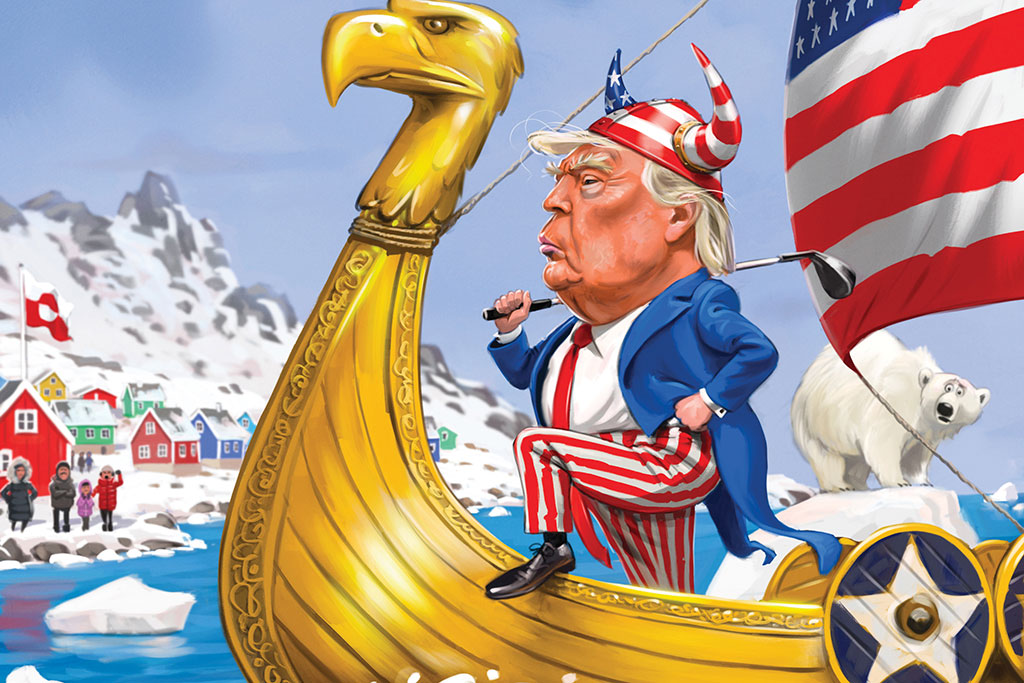Why Javier Milei is different
The new Argentine president, Javier Milei, is neither left nor right. But can he succeed?

Get the latest financial news, insights and expert analysis from our award-winning MoneyWeek team, to help you understand what really matters when it comes to your finances.
You are now subscribed
Your newsletter sign-up was successful
Want to add more newsletters?

Twice daily
MoneyWeek
Get the latest financial news, insights and expert analysis from our award-winning MoneyWeek team, to help you understand what really matters when it comes to your finances.

Four times a week
Look After My Bills
Sign up to our free money-saving newsletter, filled with the latest news and expert advice to help you find the best tips and deals for managing your bills. Start saving today!
The mainstream press has totally misunderstood Argentina’s new president, Javier Milei. We pay attention to Argentina. Partly because we have an office in Buenos Aires and investments in Salta Province, and partly because we learn from it.
When it comes to politics and finance, there is no goofy, absurd and counterproductive trick the Argentines haven’t tried at least once. We study their trip over the last 120 years – from king of the road, and then, down into the gutter. And now we get to watch as they try to tow themselves back on the highway. (We even played a small part in Milei’s election. The New York Times says an endorsement from former president Mauricio Macri helped put Milei over the top. Our office down there put Milei and Macri together.)
But just look at the press coverage. Every publication from The Washington Post to Reuters reports has him down as a “far right” extremist. The Post says his election marks “the sharpest turn to the right in four decades of democracy in the country”. Turn to the right? Do these reporters know their left from their right?
MoneyWeek
Subscribe to MoneyWeek today and get your first six magazine issues absolutely FREE

Sign up to Money Morning
Don't miss the latest investment and personal finances news, market analysis, plus money-saving tips with our free twice-daily newsletter
Don't miss the latest investment and personal finances news, market analysis, plus money-saving tips with our free twice-daily newsletter
The New York Times, meanwhile, wanted to make it even clearer what we were dealing with. It called Milei a “mini-Trump”. Even Trump himself seems to believe it. It falls to us to fact-check. And what we find is that the only thing Milei and Trump have in common is their enemies.
The New York Times, The Washington Post, the establishment, the press, academia, the politicians and bureaucrats – none welcomes a fake reformer… and certainly not a real one. The earnest professors, weapons suppliers, columnists and up-and-coming reporters, newly elected members of Congress, Wall Street honchos – all have a keen interest in “what is”. They are the ones who shape public policies. They are the chief, and maybe the only, beneficiaries.
“What isn’t” – a world in which the chips fall where they may, not necessarily where the elite want them; that is, a world with less government – is unwelcome. In the world that is, they see government as the source of wealth and power. The only question is: where does it go? To the left, poorly represented by Joe Biden? Or to the right, poorly represented by Donald Trump?
On the left, Biden promises more of the same – more rules, more regulations, more deficits and more debt. He will continue spending on favoured projects, boosting asset prices, giving generous pay-offs for lobbyists and insiders, and more profits for cherished industries. If any of these things are threatened – say, by a “debt ceiling” or a recession – Team Biden will do whatever is necessary to protect them.
Trump, on the right, is another matter. Generally despised and distrusted by the great and the good, he is the perfect foil for the elite left – a fake and incompetent reformer.
Both Biden and Trump believe that “the people” can’t be allowed to err and stray like lost sheep. They need direction, and they will give it to them – at the barrel of a gun, if necessary.
This is what makes Milei different. He is neither right nor left. For him, the enemies are those in the “political caste”. He aims to clear them out – the profiteers, hangers-on, lobbyists, consultants, think tank “experts”, parasites, bureaucrats and other freeloaders – and let “the people” decide for themselves what to do with their own money.
Will he succeed? Not likely, but we will keep our eyes open.
This article was first published in MoneyWeek's magazine and all information was correct at the time of writing. Enjoy exclusive early access to news, opinion and analysis from our team of financial experts with a MoneyWeek subscription.
Related articles
- How Argentina embarked on the road to ruin
- Argentina’s economic flames won’t spread
- Argentina's Javier Milei – what are his plans and will they work?
- Javier Milei is cutting the deadwood
- Pedro Castillo: leftist outsider who rode to power in Peru
Get the latest financial news, insights and expert analysis from our award-winning MoneyWeek team, to help you understand what really matters when it comes to your finances.
Bill Bonner is an American author of books and articles on economic and financial subjects. He is the founder of Agora Financial, as well as a co-founder of Bonner & Partners publishing.
-
 Average UK house price reaches £300,000 for first time, Halifax says
Average UK house price reaches £300,000 for first time, Halifax saysWhile the average house price has topped £300k, regional disparities still remain, Halifax finds.
-
 Barings Emerging Europe trust bounces back from Russia woes
Barings Emerging Europe trust bounces back from Russia woesBarings Emerging Europe trust has added the Middle East and Africa to its mandate, delivering a strong recovery, says Max King
-
 How a dovish Federal Reserve could affect you
How a dovish Federal Reserve could affect youTrump’s pick for the US Federal Reserve is not so much of a yes-man as his rival, but interest rates will still come down quickly, says Cris Sholto Heaton
-
 New Federal Reserve chair Kevin Warsh has his work cut out
New Federal Reserve chair Kevin Warsh has his work cut outOpinion Kevin Warsh must make it clear that he, not Trump, is in charge at the Fed. If he doesn't, the US dollar and Treasury bills sell-off will start all over again
-
 How Canada's Mark Carney is taking on Donald Trump
How Canada's Mark Carney is taking on Donald TrumpCanada has been in Donald Trump’s crosshairs ever since he took power and, under PM Mark Carney, is seeking strategies to cope and thrive. How’s he doing?
-
 Rachel Reeves is rediscovering the Laffer curve
Rachel Reeves is rediscovering the Laffer curveOpinion If you keep raising taxes, at some point, you start to bring in less revenue. Rachel Reeves has shown the way, says Matthew Lynn
-
 The enshittification of the internet and what it means for us
The enshittification of the internet and what it means for usWhy do transformative digital technologies start out as useful tools but then gradually get worse and worse? There is a reason for it – but is there a way out?
-
 What turns a stock market crash into a financial crisis?
What turns a stock market crash into a financial crisis?Opinion Professor Linda Yueh's popular book on major stock market crashes misses key lessons, says Max King
-
 ISA reforms will destroy the last relic of the Thatcher era
ISA reforms will destroy the last relic of the Thatcher eraOpinion With the ISA under attack, the Labour government has now started to destroy the last relic of the Thatcher era, returning the economy to the dysfunctional 1970s
-
 Why does Trump want Greenland?
Why does Trump want Greenland?The US wants to annex Greenland as it increasingly sees the world in terms of 19th-century Great Power politics and wants to secure crucial national interests